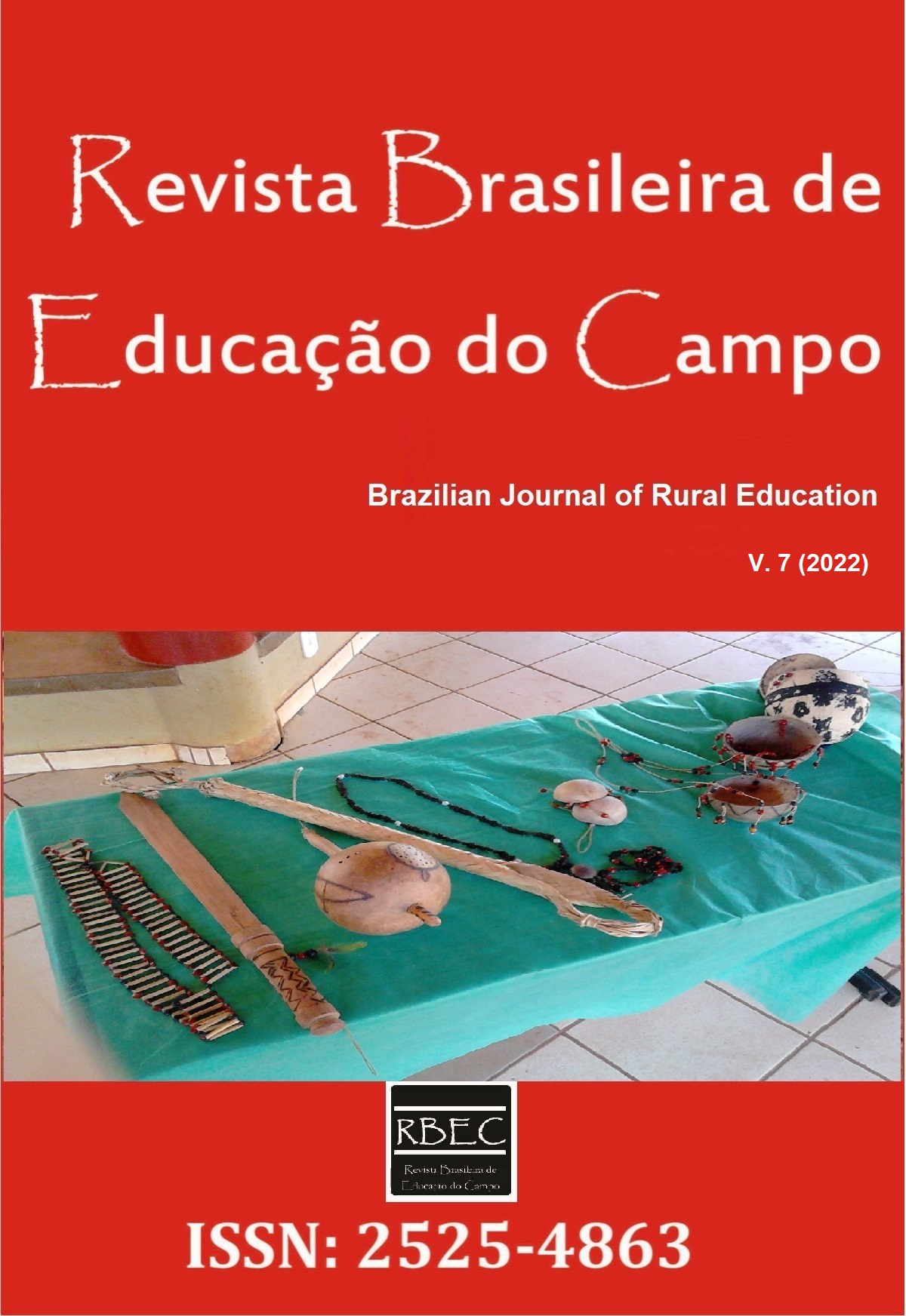Pedagogic theories in Rural Education: perceptions and confirmations from the analysis of political-pedagogical projects in the context of Ação Escola da Terra at UFBA
DOI:
https://doi.org/10.20873/uft.rbec.e13891Abstract
ABSTRACT. In the article, we compare pedagogical theories in movement in rural education, based on propositions of political-pedagogical projects in five municipalities in Bahia whose teachers from schools located in rural areas participated in the formation of the Ação Escola da Terra promoted by UFBA. Such comparison aimed to verify to what extent the pedagogical theories that underlie these documents approach or distance themselves from the assumptions of historical-critical pedagogy, understanding that the level of approximation implies an element that could favor, or not, an effective implementation of this pedagogical aspect in the researched educational contexts. The result of the documental analysis revealed that the pedagogy of popular education, the pedagogies of practice and the pedagogies of learn to learn prevail in the field of education in these contexts, characterizing a theoretical eclecticism, which constitutes an obstacle, although not decisive, for the implementation of historical-critical pedagogy in rural education in these municipalities.
Downloads
Literaturhinweise
Alarcão, I. (Org.). (1996). Formação reflexiva de professores. Porto: Porto Editora.
Arroyo, M. G. (1991). A escola possível é possível? In Arroyo, M. G. (Org.). Da escola carente à escola possível (s./p.). São Paulo, SP: Loyola.
Arroyo, M. G. (1999). Prefácio. In Kolling, E., Néry, I., & Molina, M. C. (Orgs.). Por uma educação básica do campo (s./p.). Brasília, DF: UNB.
Bezerra Neto, L. (2010). Educação do campo ou educação no campo, HISTEDBR On-line, 10(38) 150-168. https://doi.org/10.20396/rho.v10i38.8639696
Brasil. (1993). Ministério da Educação. Secretaria da Educação Fundamental. Declaração Mundial sobre Educação para Todos: satisfação das necessidades básicas de aprendizagem. In: BRASIL. Plano Decenal de Educação para Todos. Brasília, DF: MEC/SEF.
Delors, J. (2002). Educação: um tesouro a descobrir. Brasília, DF: Cortez, MEC, UNESCO.
Duarte, N. (2008). Por que é necessária uma análise crítica marxista do construtivismo. In Lombardi, C., & Saviani, D. (Orgs.). Marxismo e educação: debates contemporâneos (s./p.). 2. ed. Campinas, SP: Autores Associados: HISTEDBR.
Facci, M. G. D. (2004). Valorização ou esvaziamento do trabalho do professor?: um estudo crítico-comparativo da teoria do professor reflexivo, do construtivismo e da psicologia vigotskiana. Campinas, SP: Autores Associados.
Freire, P. (1978). Ação cultural para a liberdade e outros escritos. Rio de Janeiro, RJ: Paz e Terra.
Freire, P. (1987). Pedagogia do Oprimido. Rio de Janeiro, RJ: Paz e Terra.
Gentili, P. (2001). Um bate papo sobre Educação e Neoliberalismo onde nunca se fala de Portugal. Revista A Página da Educação, (1). Recuperado de: https://www.apagina.pt/?aba=7&cat=1&doc=7044&mid=2
Gandu. (2013). Secretaria Municipal de Educação. Coordenação pedagógica das escolas do campo. Projeto Político-Pedagógico das escolas do campo. GANDU: Ba.
Mazzeu, L. T. B. (2009). Política de formação docente no Brasil: fundamentos teóricos e epistemológicos. In Anais da 32ª Reunião Anual da ANPEd. Caxambu, MG. Recuperado de http://www.anped.org.br/reuniões/32ra/arquivos/travalhos/gt05-5789-int.pdf
Paiva, V. P. (1980). Paulo Freire e o nacionalismo desenvolvimentista. Rio de Janeiro, RJ: Civilização Brasileira.
Piaget, J. (1983). Jean Piaget. São Paulo, SP: Victor Civita (Coleção Os pensadores)
Santa Inês. (2017). Secretaria Municipal de Educação. Projeto Político-Pedagógico das Escolas do Campo. Santa Inês, Ba.
Santos, C. E. F. (2013). O aprender a aprender na formação de professores do campo. Campinas: Autores Associados; Vitória da Conquista, BA: Edições UESB.
Santos, M. G. (2020). Implementação da pedagogia histórico-crítica na educação do campo de municípios baianos por meio da ação escola da terra: contradições e possibilidades (Tese de Doutorado). Universidade Federal de São Carlos, São Carlos.
Saviani, D. (2011). História das ideias pedagógicas no Brasil. 3. ed. Campinas, SP: Autores associados.
Saviani, D. (2012). Pedagogia histórico-crítica: primeiras aproximações. 11. ed. Campinas: Autores Associados. (Coleção educação contemporânea)
Teolândia. (2018). Secretaria Municipal de Educação. Colégio Municipal Álvaro Paulo de Souza. Projeto Politico-Pedagógico. Teolândia, Ba.
Ubaíra. (2014). Secretaria Municipal de Educação. Projeto Político-Pedagógico das escolas municipais com classes multisseriadas do Ensino Fundamental I. Ubaíra, Ba.
UFBA. (2017). Universidade Federal da Bahia. Faculdade de Educação. Programa Escola da Terra – Curso de Aperfeiçoamento (200 horas) SECADI/MEC em Pedagogia Histórico-Crítica para as escolas do campo.
Wenceslau Guimarães. (2015). Secretaria Municipal de Educação. Núcleo da Vila Tancredo Neves. Projeto-Político Pedagógico. Wenceslau Guimarães, Ba.
Veröffentlicht
Zitationsvorschlag
Ausgabe
Rubrik
Lizenz
Creative Commons Attribution License
Creative Commons Attribution License
Proposal for Copyright Notice Creative Commons
1. Policy Proposal to Open Access Journals
Authors who publish with this journal agree to the following terms:
A. Authors retain copyright and grant the journal right of first publication with the work simultaneously licensed under the Creative Commons Attribution License that allows sharing the work with recognition of its initial publication in this journal.
B. Authors are able to take on additional contracts separately, non-exclusive distribution of the version of the paper published in this journal (ex .: publish in institutional repository or as a book), with an acknowledgment of its initial publication in this journal.
C. Authors are permitted and encouraged to post their work online (eg .: in institutional repositories or on their website) at any point before or during the editorial process, as it can lead to productive exchanges, as well as increase the impact and the citation of published work (See the Effect of Open Access).














